The history of Vikings often depicts them as ruthless raiders in pop culture. Little do everyone know, they were actually a multifaceted society with achievements beyond plundering. From around 790 CE to 1066 CE, they excelled as farmers, builders, sailors, and explorers. Unlike the Romans, they didn’t aim to build a centralized empire; instead, they were united by a common language and cultural heritage from the Scandinavian region.
The history of viking is also filled with tales about their exploits and legendary figures like Ragnar Lodbrok, Bjorn Ironside, Ivar the Boneless, and Leif Erikson. These stories, though possibly over time, are exaggerated to highlight the Vikings’ adventurous spirit and thirst for exploration.
And the History of Vikings Began
The history of Vikings began with the infamous raid on Lindisfarne in 793 CE that started the widespread Viking activity throughout Europe. Ragnar Lodbrok, though possibly a composite figure, epitomized the Viking warrior. He led raids on churches and monasteries in Britain and France. His alleged death, possibly by illness or at the hands of King Aella, led to revenge by his son, Ivar the Boneless.
The next chapter in the history of Vikings was the invasion of England in 865 CE by Ivar’s Great Heathen Army. It marked a shift from raiding to colonization. His brother, Bjorn Ironside, also left a legacy as the Viking king of Sweden, known for his raids along the French and Spanish coasts.
Harald Fairhair, considered the Father of Norway, united Viking kingdoms under his rule.His son, Eric Bloodaxe, ruled Norway and later established a settlement in York. Other notable figures included in the history of Vikings are Egill Skallagrimsson, a fierce warrior and poet, and Sweyn Forkbeard, who briefly became the king of England.
Religion and Vikings
As Christianity spread across Europe it also started affecting the history of Vikings. They encountered Christian traders and missionaries. Some, like Olaf Tryggvason, embraced Christianity and attempted to convert their people through force. Leif Erikson, son of Erik the Red, played a role in spreading Christianity to Iceland and Greenland under King Olaf’s influence.
Harald Hardrada, known as the Last Great Viking Ruler, traveled widely and waged wars across Europe. His attempt to claim the English throne ended with his defeat by King Harold Godwinson in 1066, marking the end of the Viking Era.
Read More:- Turkey’s Inflation Skyrocket as Elections Loom
While the history of Vikings often describe them for brutality. Their contributions to exploration, colonization, and cultural exchange cannot be overlooked. Their legacy lives on in modern pop culture, where they are celebrated as legendary adventurers and warriors.
Do you like Anime? Go to Pop Media Pulse
